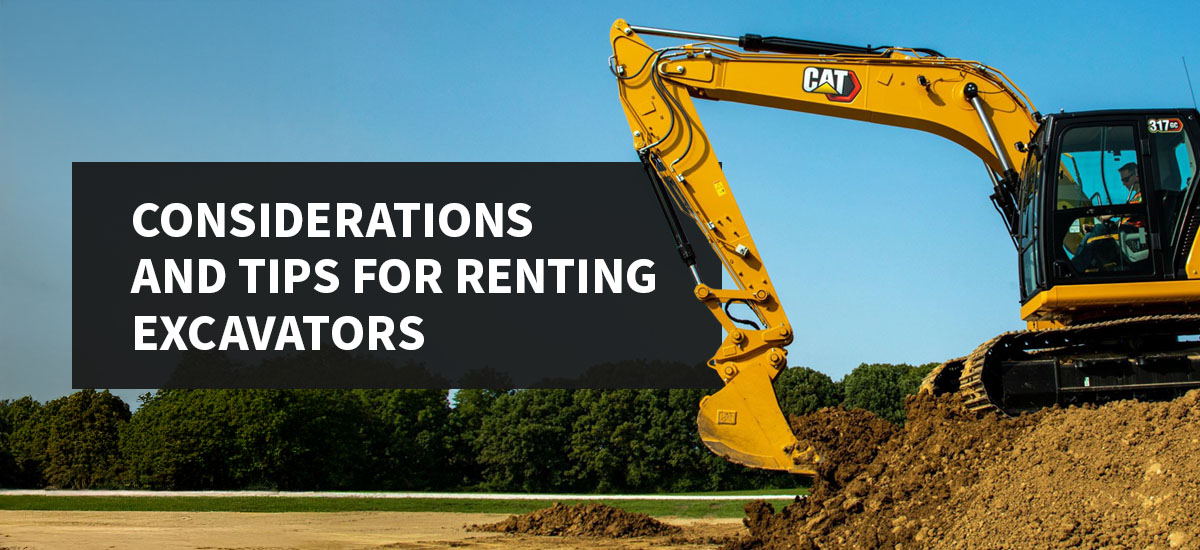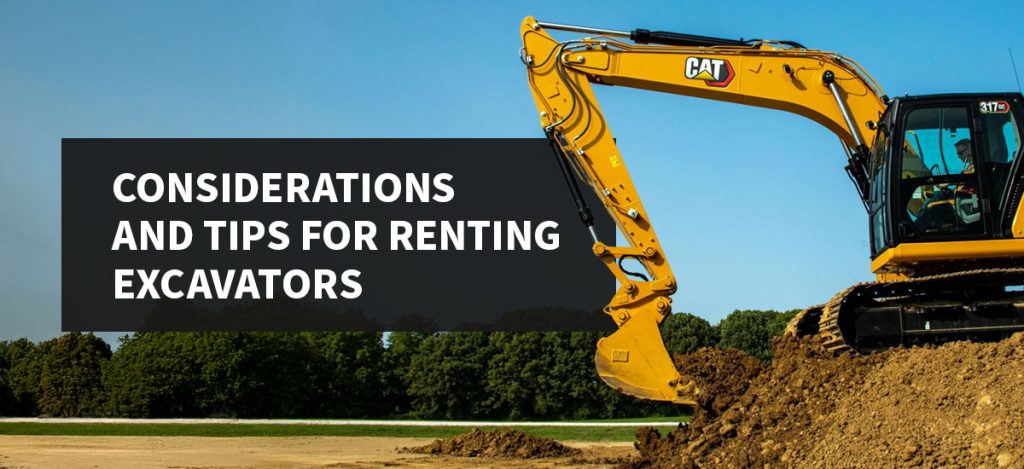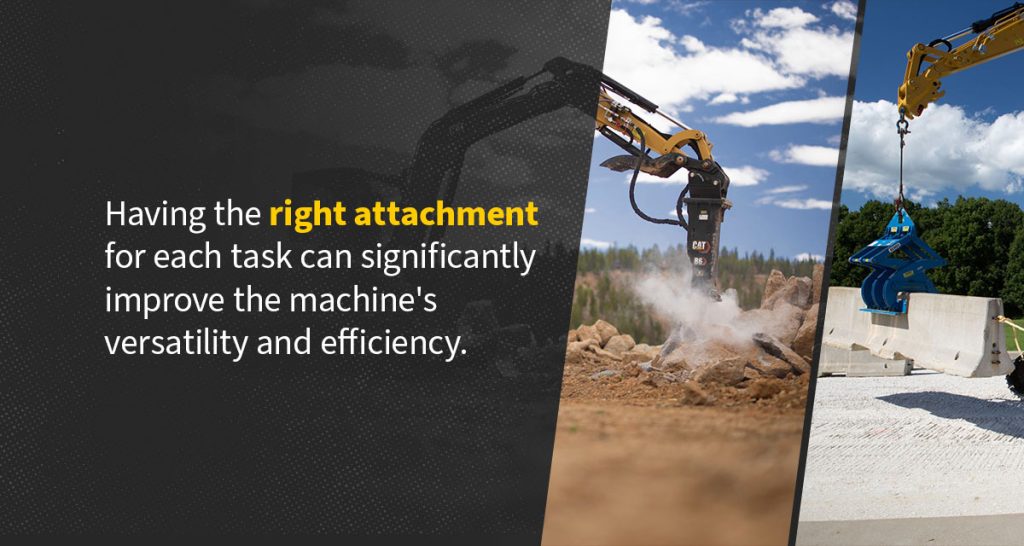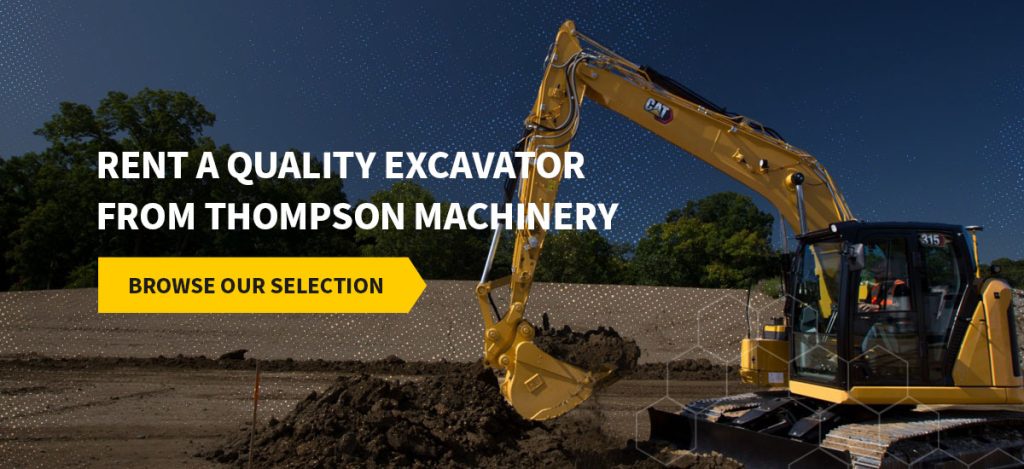Understanding how to rent an excavator that’s right for each project can help you save money and increase efficiency across your operations. From jobsite terrain and specific tasks to budget and duration, considering each detail is important for strategic excavator selection.
Use the following tips to choose the perfect excavator for your projects and ensure a smooth rental process.
Understand Different Types of Excavators
The first step before renting an excavator is understanding how each type differs. Consider how each of these excavator types can support your needs:
Standard or Large Excavators
Standard excavators offer the largest size and greatest weight and digging capacities. They are perfect for heavy-duty tasks and large construction projects.
Miniexcavadoras
Mini excavators are smaller pieces of equipment that offer enhanced maneuverability in tight spaces. Construction teams often use mini models for smaller jobsites or zones containing several obstacles to work around.
CR Mini Hydraulic Excavators
A compact radius (CR) mini hydraulic excavator has a smaller tail swing radius than traditional mini excavators. It can maneuver in tight spaces where a full tail swing would be challenging or impossible.
CR Variable Angle Boom Mini Hydraulic Excavators
A CR variable angle boom (VAB) mini hydraulic excavator is a compact, highly maneuverable piece of equipment. The VAB increases the excavator’s reach and linkage flexibility for diverse tasks.
Choose an Excavator Based on Your Needs
Choosing excavators for rent depends on these key factors:
Type of Work
The type of work you need to perform is one of the most important factors when renting an excavator. Before choosing a model, consider which specific tasks your team needs to complete.
Here are some of the most common tasks you might need an excavator for:
- Digging
- Limpieza del terreno
- Heavy material handling
- Demolition
- Landscaping
- Foundation work
- Trenching
- Utility work
Large or standard excavators are typically the best option for digging, land clearing, demolition and heavy material handling on large worksites, while mini excavators are excellent options for smaller worksites and lighter loads.
Operators often prefer mini excavators for landscaping work. Teams usually depend on large excavators for commercial construction jobs and mini excavators for residential projects.
Necessary Attachments
It’s also important to choose the right attachments when renting an excavator. You can equip your rented machine with various attachments, such as the following, to enhance its capabilities:
- Pinzas
- Sinfines
- Martillos
- Cubos
- Rastrillos
- Couplers
- Pulgares
Check with the rental company to ensure your chosen excavator is compatible with the attachments you need to use. Having the right attachment for each task can significantly improve the machine’s versatility and efficiency.
Project Weight and Size Restrictions
Evaluate your project site, considering its specific weight restrictions. Pay close attention to sensitive infrastructure such as utilities and underground irrigation systems, choosing an excavator light enough to prevent damage and disruptions.
Once you understand your site’s weight restrictions, you can choose an excavator with the appropriate operating weight and protect the integrity of underground systems. This also helps you comply with local regulations and reduce the risk of service interruptions.
Height Requirements and Lifting Capacity
Understanding how much weight the excavator needs to handle and how far it needs to reach is also essential. Consider your material’s weight, density and volume before choosing equipment.
How far and how high will your team need to operate the excavator boom? For example, additional reach may be necessary if you need to dump loads into tall containers or perform demolition work. Choosing an excavator with adequate reach and lifting capacity is vital for safety and efficiency.
Profundidad de excavación
How deep will your team need to dig for the next project? Each excavator has a different maximum digging depth. Choosing the right excavator ensures you can dig to the necessary depth without limitations.
Worksite Terrain
A jobsite’s terrain determines whether you need a wheeled or tracked excavator. Wheeled excavators are ideal for hard, flat surfaces such as asphalt because the wheels can move faster and prevent surface damage. Operators prefer tracked excavators for uneven, muddy or soft terrain because they distribute weight more evenly for enhanced stability.
Worksite Restrictions
Restrictions such as limited space, surrounding structures, utilities and overhead power lines can impact an excavator’s operations. Evaluate your worksite’s size and potential obstacles to determine the ideal excavator size, mobility and reach.
Each excavator has a specific tail swing radius, which determines how much of the cab’s engine and rear extends beyond the undercarriage’s width while rotating. The tail swing radius is an important factor for maneuverability and safety.
Project Duration
Choose an excavator from a rental company with flexible rental periods. Predict how long your project will take and the specific dates you will need the equipment. You may be able to benefit from special monthly rental periods or discounted rates if you have a longer project. When you establish a project timeline, you can budget accordingly and ensure your rental period meets your needs without unnecessary extensions.
Eficiencia de combustible
An excavator’s fuel efficiency impacts how much you spend on fuel during your rental period. Check a piece of equipment’s fuel consumption rate before renting to estimate fuel costs and ensure it fits your budget.
Transport
Do you have specialized equipment, a flatbed truck or a trailer to transport an excavator to your site, or do you need to arrange transport through the rental company? Ensure your transport equipment can handle an excavator’s weight and size before renting. You must also consider potential escort and local permits required for oversized loads. In some cases, it’s best to request transport from the rental company and work the associated costs into your budget.
Budget
When planning your equipment rental budget, it’s important to consider all associated costs. As mentioned above, the following factors contribute to your total rental cost:
- Rental period
- Potential rental extension
- Equipment transport
- Combustible
Understand the Benefits of Renting vs. Buying
Renting is a fantastic option because it offers the following advantages:
- Cost Savings: While purchasing is typically the best option for frequent usage, renting enables you to use different types of equipment for various projects without making large purchases. Renting also helps you save money on maintenance because the rental company takes care of service and repair needs for you.
- Versatility: Excavator rentals enable you to expand your capabilities. You can rent what you need for specialized tasks and meet each client’s needs effectively.
- Opportunity to test equipment before purchasing: If you’re interested in purchasing an excavator, renting is an excellent opportunity to try different models before choosing the perfect one for your needs.
Follow Best Practices for Renting Excavators
The following excavator rental tips help ensure a smooth rental process:
- Thoroughly review the contract: Pay close attention to clauses, such as liability for damage, insurance coverage and who is responsible for repair needs.
- Perform pre-operation inspections: Carefully inspect equipment before each use, checking key components like fluid levels, hoses, belts and controls.
- Promptly report any damage or malfunctions: Report any equipment issues with the rental company immediately.
- Offer model-specific training: Train each operator on how to use the specific rented excavator model safely, including operating and emergency shutdown procedures.
- Prepare your site: Inspect your jobsite for potential obstacles or hazards, like overhead power lines, unstable soil or underground utilities, to support safe excavator operation.
Rent a Quality Excavator from Thompson Machinery
Renting the right excavator enables you to expand your services and boost efficiency. Thompson Machinery offers a wide selection of rental equipment to meet your project needs, and our experienced team can help you select the perfect model for your project specifications. Our flexible rental periods make it easy to access what you need while saving money.
Contact us to learn more about our excavators and the rental process.






